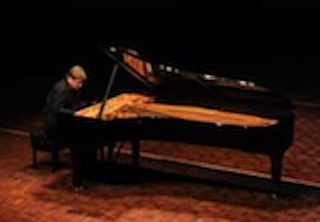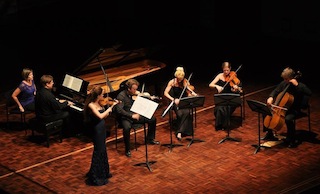
Peeter Laul and Friends
“Peeter Laul and Friends” brought together Leningrad-born
pianist Peeter Laul and other distinguished artists of the 2013 Pärnu
Music Festival, including violinist Anna-Liisa Bezrodny and violinists Lasse
Joamets and Vivika Sapori-Sudamäe, violist Johanna Vahermägi
and cellist Leho Karin July 17 in Pärnu’s Kontserdimaja (Concert Hall).
The two-part program was half pianistic fireworks, with transcriptions by Franz
Liszt of opera excerpts by Richard Wagner, and half Ernest Chausson, i.e. his
1891 Concert for Violin, Piano and
String Quartet.

Laul provided an arresting tribute to Wagner on his 100th anniversary. It might
have been Liszt himself on the keys, so transfixing was Laul’s
performance of these virtuosic showpieces, which included excerpts from five
Wagner operas. There was bravura to burn here, as well as affecting lightness,
with consummate voicing and balances and gestures closely attuned to the
musical moment. “Elsa’s Procession to the Cathedral”
from Lohengrin built to the requisite
majesty, while Laul was all over the keys in “Spinning Song”
from Der fliegende Holländer. In “March
of the Holy Grail” from Parsifal,
he followed a long-held ending with a soft epilogue evoking the tolling of
bells. Needless to say, the “Liebestod” from Tristan and Isolde reached a shattering
climax, and the Overture to Tannhäuser, which completed the
set, was stirring in the extreme. Also needless to say, his piano (a Steinway)
underwent complete re-tuning at intermission.
Chausson’s
1891 Concert was a revelation and a
daunting achievement in the hands of Laul, Bezrodny and the quartet comprising
Joamets, Sapori-Sudemäe, Vahermägi and Karin. Following three big
strokes of a germinal motto motif, Bezrodny entered with a luscious exposition.
The gently rocking theme of the “Sicilienne” gave way to more
sweeping passages, and the “Grave” which followed grew quite
intense. Most remarkable for sheer stamina was the “Trés
animé”
finale, where Bezrodny played constantly in the highest register of her
instrument (an observation applicable to the work as a whole, perhaps for
reasons of projection and balance).

(first published at www.ConcertoNet.com)